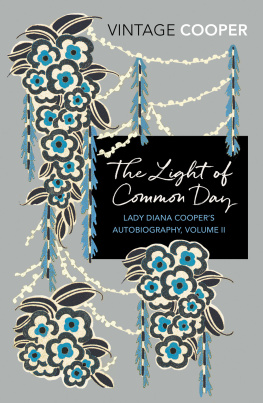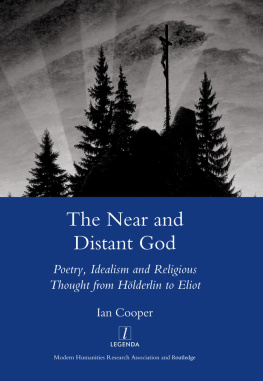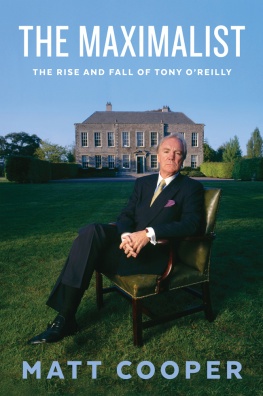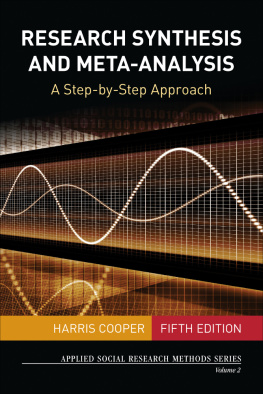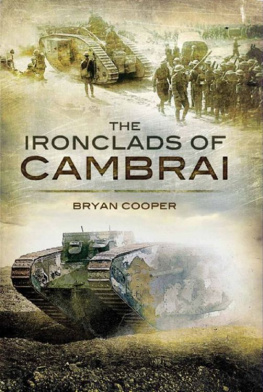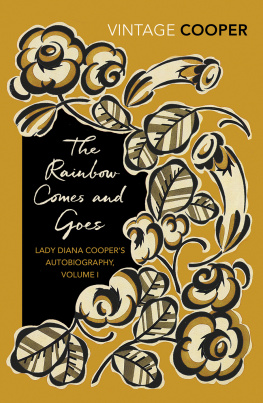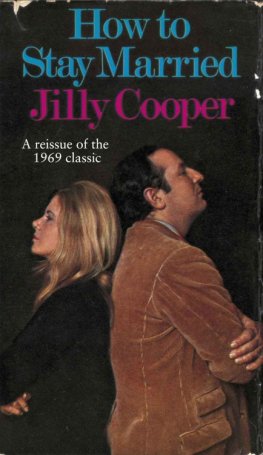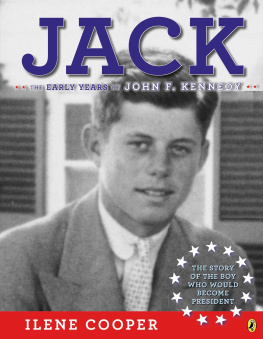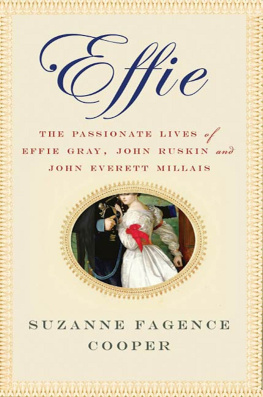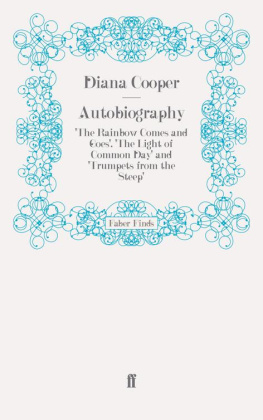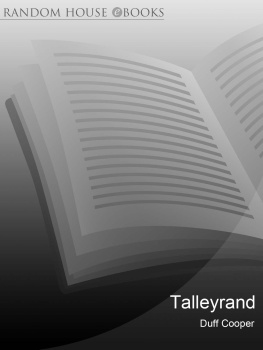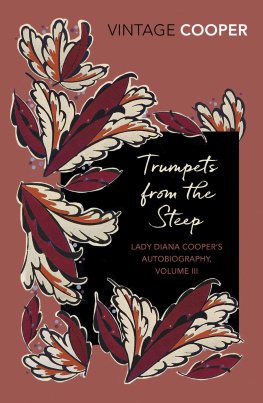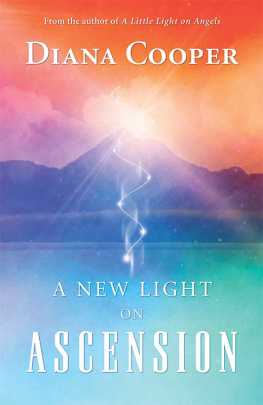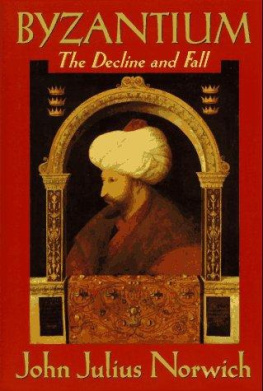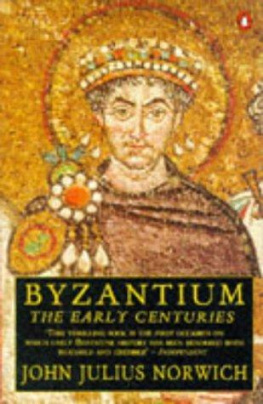The Miracle
ABOUT THE AUTHOR
Lady Diana Cooper was born on 29 August 1892. She married Alfred Duff Cooper, DSO, who became one of the Second World Wars key politicians. Her startling beauty resulted in her playing the lead in two silent films and then Max Reinhardts The Miracle. In 1944, following the Liberation of Paris, the couple moved into the British Embassy in Paris. They then retired to a house at Chantilly just outside Paris. After Duffs death in 1954 Diana remained there till 1960, when she moved back to London. She died in 1986.
ALSO BY LADY DIANA COOPER
The Rainbow Comes and Goes
Trumpets from the Steep
LADY DIANA COOPER
The Light of Common Day

This ebook is copyright material and must not be copied, reproduced, transferred, distributed, leased, licensed or publicly performed or used in any way except as specifically permitted in writing by the publishers, as allowed under the terms and conditions under which it was purchased or as strictly permitted by applicable copyright law. Any unauthorized distribution or use of this text may be a direct infringement of the authors and publishers rights and those responsible may be liable in law accordingly.
Epub ISBN: 9781473549081
Version 1.0
1 3 5 7 9 10 8 6 4 2
VINTAGE
20 Vauxhall Bridge Road,
London SW1V 2SA
Vintage is part of the Penguin Random House group of companies whose addresses can be found at global.penguinrandomhouse.com.
Copyright Diana Cooper 1959
Cover Illustration from Fromes et Couleurs by Aug H. Thomas
Diana Cooper has asserted her right to be identified as the author of this Work in accordance with the Copyright, Designs and Patents Act 1988
First published in Great Britain by Rupert Hart-Davis 1959
This edition reissued by Vintage in 2018
penguin.co.uk/vintage
A CIP catalogue record for this book is available from the British Library
To Letty
Illustrations
The story of my days has had to be divided, because of its fearful bulk, into three parts. Let those who read and enjoyed The Rainbow Comes and Goes be prepared here for disappointment. The colours pale with the olden days far behind me and time almost abreast. With the shoals and depths of young love turned to halcyon days of marriage, what is left romantic?
The splendid vision of The Miracle in America materialises into career and homesickness. Sails set for adventure record tedious travelogues. The throne of Shakespeares kings is usurped by flesh and blood that talks in prose. Wars alarms are echoes, peace harnesses rampaging death, the glory and the dream fade into the light of common day.
These lines are to mend the break in my narrative, which starts again as abruptly as it ended.
1
The Miracle
In November 1923, with a high heart, unaccustomed courage, a certain confidence in my new vocation, and the splendid vision of The Miracle no longer a mirage, I boarded the pretty dancing Aquitania for my first ocean journey. Duff was by my side and in my heart, so everything delighted and excited us the fine big cabin, the bath with fresh and sea water, the springing decks and space, the interminable menus, the orchestra and the bustle, the cupboard-trunks, bouquets and radiograms, but through the delight and excitement flitted the sinister shade of the Titanic. I felt something of a Columbus too. In 1923 not so many of my English friends had crossed the Atlantic, and we were farewelled as though for circum-navigation, with Fortnum & Mason provisions, cases of champagne, prayers, telegrams and a bevy of friends to speed us well at Southampton. On the third day it got rough, the Titanic shadow loomed darker and I suffered fearful shame when Duff took me to the ships kind doctor that he might prescribe some calmative. He handed me bromide with a look of contemptuous pity. I suppose there are any amount of frightened people like me? I said hopefully. Sometimes a few emigrants in the hold, he replied.
Duff was sympathetic, so it did not matter. The bromide did not calm, but the waves did. We threw ourselves into the amusing novelty of life on a big liner auctions, hat-pools, and horses and camels in the gymnasium. Halfway over, radiograms began fluttering in from friends in America. Less welcome ones arrived from newspapers, and formidable ones from Morris Gest, warning me of the pressmen at Quarantine and suggesting replies that I should give to difficult questions. This made me nervous, as some of the instructions, I saw on reading, I could not obey. To the question: Who is to be the first to play the Madonna? I was to answer: I am, and to the supplementary How did I know? Because I had had a message from God.
I naturally replied, when they asked me, that I had no idea who would be the Madonna. I only knew that I had been engaged first. The cameras clicked away and the Just one mores seemed to have no end, but I did not then mind what I now abhor, and I had confidence in being well dressed by Madame Ospovat (the Russian designer of genius who had become famous in London overnight), though in the photographs of those days I look grotesque. On the quay stood Chaliapin and Morris Gest, who pinched Chaliapins cheek in greeting. This seemed too familiar to Chaliapin, loud words were said in Russian and a quickly forgotten blow administered. Beloved Kommer was there to pour essential oils on us all, and soon we were installed in our beautiful suite at the Ambassador Hotel, with a Bible each by our beds and the crystal New York sky a background to our high-perched luxury. It was Sunday and as quiet as a trafficless town can be. There were no orchids for me, but for Duff a case of Scotch and another of Bourbon whisky from Cole Porter, and also the key of Carroll Carstairss liquor-locker at the Knickerbocker Club, with which to fight Prohibition. Duff went down to explore while I unpacked. He came up to say that he had met George Gordon Moore in the lift and that we were supping with him that night. So much for the pre-war London stories that he could not show his face in New York.
At five oclock I was to be ready for rehearsal. First we must have lunch, and gape and marvel at the canyons of architecture. We went to a restaurant on Fifth Avenue Pierres shy as bumpkins and feeling lost and foreign. Duff was asked if he would have tea or coffee with his lunch. He all but collapsed. Kommer fetched me for my ordeal. I had made a Nuns rehearsal-dress to give me a little confidence, but I was very frightened. We drove to a vast unheated hall. It was freezing outside, and there was a big brazier of live charcoal, round which cowered some fifty shiverers, while another fifty or so were being rehearsed. Reinhardt strolled in, calm, with cigar-smoke curling round his magnificent brow and light compassionate eyes. I knew only him and Kommer, and it was to take me a little time to learn the rest of them. Luckily no one seemed in the least interested in my arrival. Maria Carmi was not due in New York for another three or four weeks. Stand here, Miss Manners, said Mr West, a stage-manager. So I stood there on a chair, suddenly very, very happy. I had come back to what I was used to rehearsals and stage jargon and the palpitating interest of shop.

